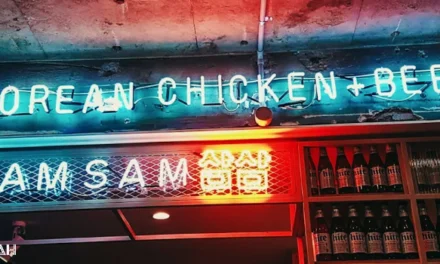Dishoom is one of London’s hottest Indian restaurant chains, with multiple buzzing locations spread across the city. Dishoom first launched in Covent Garden in 2010 and has since expanded to 5 trendy locations in London, plus outposts in Edinburgh and Manchester. Known for putting a modern twist on classics dishes from the Bombay cafe scene of the 1960s, Dishoom packs the flavorful punch of authentic Indian cuisine into a hip, energetic environment.
But with Islam being the second largest religion in the UK, many patrons wonder about Dishoom’s stance on halal food. Does Dishoom cater to the dietary restrictions of Muslim diners? Let’s take a comprehensive look at what “halal” means, closely examine Dishoom’s full menu and restaurant ambience, and provide tips for ordering halal-compliant options off the menu.
Defining Halal Food and Why It Matters to Muslims
Halal is an Arabic word meaning “permissible” or “lawful” within Islamic law. When it comes to food and drink, halal refers to any items that adhere to the dietary standards put forth in the Quran. For meat to be considered halal, the animal must be slaughtered in a specific ritually humane manner known as Zabihah. This method of slaughter is designed to minimize suffering of the animal. In addition, the person slaughtering must recite a blessing over each animal.
Pork and alcohol are strictly prohibited under halal guidelines. Other food ingredients like gelatin, enzymes, emulsifiers need to be confirmed halal as well. Even non-food items like cosmetics and pharmaceuticals can seek halal certification to indicate they contain no haram (impermissible) substances.
Following a halal diet is very important for observant Muslims, as it is part of living life fully within Islamic principles. The Quran specifically states “O mankind! Eat of that which is lawful (halal) and good on the earth.” (2:168). Consuming haram food or drink is considered a sin.
With Islam being the second largest religion worldwide after Christianity, demand for halal certified food options is growing exponentially. The global halal food market size was valued at $2.1 trillion in 2021 and is expected to grow 9% through 2028. Many restaurants now actively seek halal certification to indicate they use permissible ingredients and food preparation methods that accommodate Muslim patrons.
Examining Dishoom’s Menu Offerings Through a Halal Lens
Dishoom’s menus are filled with mouthwatering Indian favorites meant to transport diners to 1960s Bombay. Let’s analyze some popular dishes on the menu to see which items are halal-friendly:
Meat Entrees
Dishoom offers several meat-based curries, kebabs, biryanis, and more. The use of chicken and lamb is permissible under halal guidelines. However, the way the meat is sourced and cooked must adhere to standards:
-
Meat must come from animals slaughtered in the ritually humane Zabihah method mentioned earlier. Dishoom does not confirm if this standard is met by all its meat suppliers.
-
Cooking equipment and utensils must be thoroughly cleaned between handling halal and haram (forbidden) foods to prevent cross-contamination. Dishoom uses the same equipment for pork dishes which could be an issue.
-
Meat must never come into contact with pork or alcohol while cooking. Some Dishoom recipes like the Pork Vindaloo clearly would not meet this standard.
Seafood & Vegetarian
Any seafood and vegetarian dishes at Dishoom like the Fish Curry, Paneer Makhani, or Daal are inherently halal-friendly if they contain no questionable ingredients like alcohol or pork-based stocks.
Bacon & Sausages
All pork products including bacon, sausages, ham are strictly forbidden under halal guidelines. While Dishoom doesn’t use pork in every dish, it does serve several breakfast plates containing pork. Contamination risks also exist if bacon and sausages are cooked on same grill as halal meats.
Alcohol
In addition to its food menu, Dishoom also has an extensive cocktail program plus beer and wine lists. Alcohol is completely forbidden in Islam, so this is clearly not compliant with halal standards either.
Ambience & Environment
The lively, high-energy ambience fueled by alcohol consumption in Dishoom restaurants creates an environment some Muslim diners may not feel comfortable in, especially during weekend evenings and late nights when the party vibe is strongest. Loud music and proximity to the bar area could be controversial for halal-compliant guests.
Is Dishoom Officially Halal Certified?
To provide a definitive answer on Dishoom’s halal status – No, Dishoom is not a certified halal restaurant chain. None of their locations display halal certification or make any claims that all menu items meet Islamic dietary law.
However, Dishoom does aim to serve diverse clientele and offers some individual dishes that can be enjoyed by Muslims if ordered carefully. They also provide calorie counts on menus to accommodate Muslims fasting from dawn to dusk during Ramadan who need to be mindful of nutritional intake while abstaining from food and drink during daylight hours. But again, Dishoom restaurants are not completely halal certified from end to end.
How to Order Halal-Compliant Options at Dishoom
While not officially certified halal, Dishoom’s menus and policies do provide opportunities for Muslim patrons to enjoy halal options:
Stick to Permitted Meats & Seafood
Order chicken, lamb or seafood dishes to avoid pork and request they be prepared separately from any non-halal meat items to prevent cross-contamination.
Specify Halal-Only Ingredients
Ask for dishes to be made without alcohol or pork stocks that may be default components of some recipes. Opt for vegetarian or vegan menu items to be safest.
Avoid Alcohol
Stick to fresh juices, lassi drinks, chai, or water instead of alcohol offerings. Request mocktail versions of cocktails.
Visit During Daytime Hours
Dishoom locations tend to be more lively and alcohol-focused at night. Opt to dine earlier in the day for a more halal-friendly experience.
Request Table Away from Bar
Ask the host for seating away from the bar area and drinkers when you are being seated. Politely request music be lowered if too raucous.
Check Ingredients for Haram Substances
Those strictly following halal guidelines may want to consult with servers about ingredients in sauces, desserts, etc. to ensure no alcohol or pork derivatives are used, such as vanilla extract containing alcohol.
Bring Your Own Food
Diners are permitted to bring outside food into Dishoom locations, so bringing your own certified halal meat entree is an option. Just pay for sides and drinks from the restaurant menu.
Top Halal Indian Restaurants in the UK
For those seeking properly certified halal Indian cuisine, here are some highly recommended alternatives to Dishoom worth checking out:
Shampan – Leicester
Shampan serves delicious authentic Indian cuisine adhering to halal principles in a relaxed atmosphere. Their friendly staff aims to make Muslim diners feel comfortable. Signature dishes include lamb chops marinated in aromatic spices and juicy chicken tikka masala.
Halal Restaurant – London
As the name suggests, Halal Restaurant lives up to its reputation with no alcohol served and all meats slaughtered according to Islamic standards. Their curries, biryanis, and kebabs satisfy cravings in a family-friendly environment.
The Halal Guys – Manchester
Launched as a New York City food cart in 1990, The Halal Guys now boasts over 70 brick-and-mortar outlets worldwide. This beloved fast casual spot offers halal versions of chicken, gyro, and falafel plates.
Masala Express – Glasgow
This unassuming Pakistani & Indian eatery run by a Muslim family serves certified halal meat in flavorful curries and kebabs. Win over Glasgow locals with authentic dishes in a no-frills space.
Tayyabs – London
Tayyabs makes traditional Punjabi fare using certified halal meats and no alcohol. They’ve been voted London’s best Pakistani restaurant multiple times. Don’t miss their legendary grilled lamb chops and spicy curries.
Conclusion
So in summary, while Dishoom does not hold official halal certification, Muslim diners can enjoy select menu items by following the guidance above. Individual guests must decide their own comfort level dining at Dishoom based on their adherence to Islamic traditions. Wherever you choose to eat Indian food, be sure to check the halal status so you can indulge guilt-free!
Frequently Asked Questions – Is Dishoom Halal
Dishoom is indeed a halal restaurant. Their menu primarily consists of Indian cuisine, with a focus on chicken and lamb dishes that are certified halal.
Are all the meat dishes at Dishoom halal?
Yes, all the chicken and lamb dishes on Dishoom’s menu are prepared using halal meat and are suitable for those seeking halal food.
Does Dishoom serve alcohol?
While Dishoom serves alcohol, it is important to note that the establishment also caters to individuals who prefer to dine at a halal restaurant. They offer separate drinking and dining areas to accommodate all customers.
What are the popular items on Dishoom’s breakfast menu?
Dishoom’s breakfast menu includes various dishes such as chai, biryani, chicken berry britannia biryani, and paneer to complement the Indian dining experience.
Does Dishoom cater to specific dietary requirements?
Yes, Dishoom caters to various dietary needs, including halal, and they have a wide range of options on their menu to accommodate different preferences.
Can you clarify the halal status of the cooking equipment and utensils used at Dishoom?
At Dishoom, all cooking equipment and utensils used for chicken and lamb dishes are dedicated solely to the preparation of halal food to ensure there is no cross contamination.





